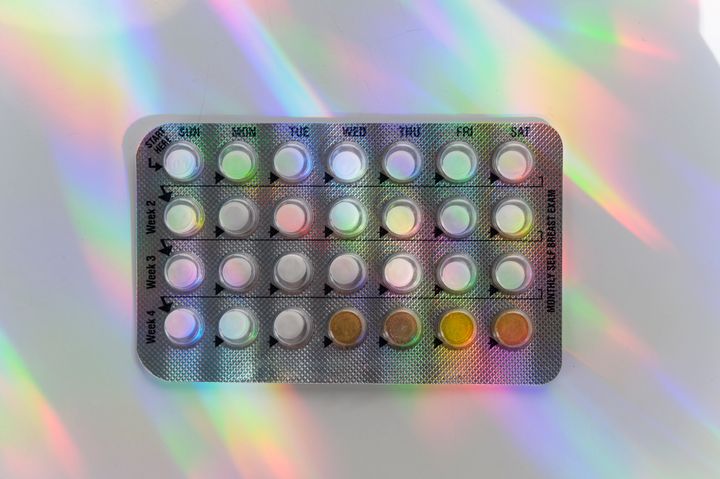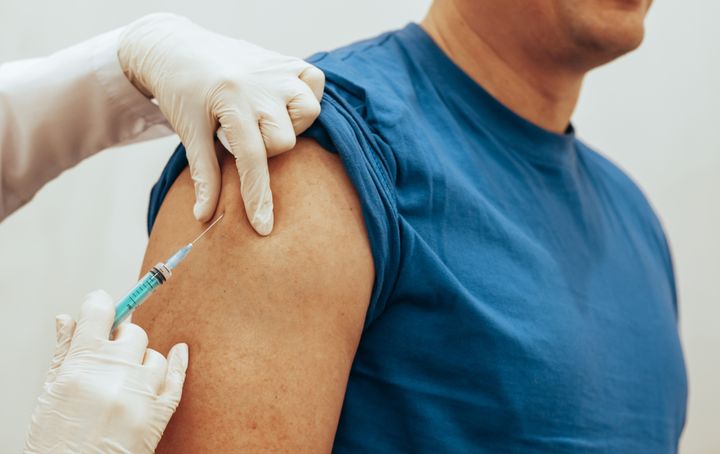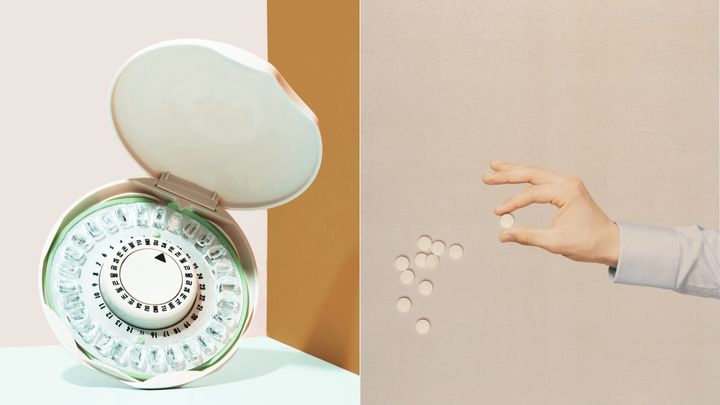News
We Are One Step Closer To Male Birth Control. We Asked Guys If They’d Use It
This week, scientists at the annual meeting of the Endocrine Society in Boston announced that we may be one step closer to male birth control becoming a reality: Judging by early clinical trials, a hormonal gel that’s rubbed on the shoulders daily may be even more effective than hormonal contraceptive options for women.
The gel, developed by the National Institutes of Health and the nonprofit Population Council, combines two main ingredients, nestorone and testosterone, the male sex hormone.
The nestorone suppresses the production of testosterone in the testes and, consequently, the development of sperm. By reintroducing synthetic testosterone, any negative effect on the sex drive is minimized.
In a clinical trial, 86% of men achieved sperm counts low enough to prevent pregnancy after 15 weeks of using the gel. For other men, the drug worked at even brisker pace, suppressing sperm production within four to eight weeks.
“We’ve been just really excited by the results,” said Diana Blithe, branch chief of the NIH’s National Institute of Child Health and Human Development, at the conference. “The combination seems to provide better, faster suppression than we expected.”
In the wake of the Supreme Court overturning Roe v. Wade and numerous states passing legislation designed to undermine or completely block access to abortion care, the drug’s development couldn’t come at a more vital time.
As it stands, the options for men wanting to prevent pregnancy are scant: use a condom, depend on the very unreliable pull-out method, or the more drastic measure of getting a vasectomy.
After the Roe news in June 2022, there was a flurry of articles about men rushing into urologist’s offices to get a vasectomy. But doctors caution not to get the snip if you’re considering “undoing it” later: While vasectomies can technically be reversed, it’s expensive and doctors say your chances for a successful reversal decrease every year after you’ve had the procedure.
The good news is that the demand for the male pill exists. One 2016 multinational study found that over 50% of men would be willing to try a male contraceptive method.
While it still may be a while until a male birth control method is approved by the Food and Drug Administration and put on the market, the desire for it seems to be growing. HuffPost recently asked men how likely they were to use hormonal contraceptives if they were to become available to them.
Some men told us they were eager to share the burden of contraception with the women in their lives. Some single men said they just want a say in their reproductive futures. We also asked them if they’d take it if it had some unpleasant side effects ― like the headaches, weight gain, nausea and lowered sex drive some women experience with the pill ― and how they feel about contraceptives being framed as a “women’s issue.”
See what eight guys of various ages and experiences had to say below.
Shana Novak/Emma Innocenti/Getty Images
Peter Skinner, a 47-year-old network and information specialist in Edmonton, Alberta, Canada
What have you and your partner(s) mostly relied on?
In the past, my wife and I have used the pill and I’d wear condoms. When we wanted to try for a baby, we stopped. But I would try male birth control.
What if it was approved, but it had some unpleasant side effects?
All medications have side effects. Any man on this planet who complains about a headache because of his birth control methods needs to reexamine whether the sex is worth it. Is this the woman you want to be tied to for the rest of your lives? If she gets pregnant, it takes two parents to raise a child. Will you be there for every Christmas concert, soccer game, volunteer at schools, and be a taxi service when they need rides? If not, take a simple pill and use a condom as backup. I did that until I had my three children and was mentally ready for kids and could financially afford them.
What are your thoughts on the idea that it’s a woman’s job to prevent pregnancy?
It’s not just a woman’s job. It’s both people’s responsibility to take precautions. All my past partners had to do was say “wrap it up” and I did. When it came time to stop having children, I went for the vasectomy instead of her going to have her tubes tied. The surgery and recovery was nothing. I was back to working the next day. She wouldn’t have been able to.
It’s not rocket science. No one can question we want the sex much of the time. If we want it, we have to respect what our partners want to do with their bodies and lives.
Man up, guys. Take control of your futures while having your fun. I have three male children below 26 and they know how important this issue is to me. I’ve lost a child and had to make the difficult decision whether to abort a baby with less than a 10% chance of living and may have caused horrible issues for my wife. It’s the hardest decision I’ve ever had to make, and a simple pill could have prevented it.
Jonathan, a tech worker in Northern Alberta, Canada
How do you feel about your contraceptive choices currently?
I feel like there are a lot of choices, but they all have some sort of drawback. My partner and I have used condoms and female birth control, either the patch or the pill. Currently condoms plus the pill.
In all honesty, how likely would you be to use hormonal birth control?
I have a terrible memory, I forget my pills all the time. So if it was a pill, I wouldn’t even bother. This short clip sums up how I feel, about if men had to take birth control pills:
I’m currently considering getting a vasectomy as I already have three kids and it seems like more of a sure thing. But I’m concerned with potential side effects. Vasectomies have so much misinformation online about it making you like a eunuch but then there are real potential issues like long-term chronic pain.
I think that my younger self definitely grew up thinking contraception is the woman’s responsibility. I think men shouldn’t force that responsibility on women but I really doubt men will step up and take charge of contraception anytime soon. And for that reason I think male contraceptives will largely be a commercial failure when it comes to market.
“I always came from a perspective of why don’t they hand this out like candy?”
– Casey, 42
Casey, a 42-year-old who lives in Southwest Ohio and works in sales
How do you feel about contraception options out there right now?
It’s clearly pretty weak. I’m a hetero cis male and since I’ve been sexually active, I’ve had some partners that were able to use contraception in all of its various forms ― pills, IUDs, patches, condoms ― and some that weren’t. With most of my partners, we relied on a combination of condoms or withdrawal coupled with the pill.
With a few long-term partners, I got to see the trials and tribulations that come from finding the right option, and let me tell you, in some cases it was really unpleasant for them. For me, it was simply deciding on which condom would perform the best. That’s not really a fair trial process. So I would be open to using male birth control because I simply want to prevent pregnancy.
If I’m going to be completely honest, I want to get a vasectomy. My partner and I are done having children. However, if we weren’t in that stage, I’d be on any approved male birth control pill.
Have you had any pregnancy scares through the years?
Definitely. A couple stand out: The first was in high school, so obviously I was terrified of all the stigma that comes with it, but also the fact that I could hurt my future and that of my partner. The next was in my early 30s with a partner that was showing signs of ending the relationship. My ultimate concern was having a child and splitting time with it. I’m a child of divorce and know that has consequences.
What if male birth control was approved, but it had some unpleasant side effects? Would you still be willing to take it?
No question. Sign me up. I would certainly monitor the side effects, if any, and stop use if necessary. It would be worth it. I’ve been thrice injected with a COVID vaccine; preventing pregnancy is as important to me as any other health issue.
How do you feel about birth control being framed as a “woman’s issue”?
What isn’t placed on the woman? This is still a patriarchal country, so it’s definitely not surprising that it would be on women to make sure they don’t get pregnant. It would appear obvious that since the entire contraceptive market is geared toward women, it automatically lays the burden of responsibility at their feet. It’s complete bullshit.
Has the overturning of Roe v. Wade made you more inclined to think about this subject on the whole?
It hasn’t made me think more about it, because I’ve always thought about it. I guess I always came from a perspective of, why don’t they hand this out like candy? Prescribed, of course, but for free and with a doctor’s supervision. And why isn’t there a pill for me? What it makes me think about more is my children and what they may someday have to endure. It’s truly terrifying and nauseating.

Jamie Atlas via Getty Images
Mathew, a 34-year-old who lives in Los Angeles and works in film and TV production
You said you’d take birth control if it was tested and approved. What if there were side effects?
I would certainly be wary of the side effects, but I couldn’t ask my partner to do something that I wouldn’t do myself. If the side effects are that unpleasant, I would explore other avenues, such as a vasectomy.
If I were a woman, I wouldn’t trust my male partner to tell me the truth about being on a contraceptive. It’s unfortunate but I’ve been around plenty of men that are very upfront about lying to get a woman into bed and have zero concern on what might happen afterwards. Contraception and preventing pregnancy shouldn’t be a woman’s issue, but when they can’t rely on the men around them, it seems like it has to be.
Has Roe v. Wade’s recent reversal impacted your feelings on any of this at all?
The overturning of Roe v. Wade has made me much more inclined to think about this subject as a whole. It’s why I’m pursuing a vasectomy.
This upcoming week, I have a consultation with a urologist to set up a vasectomy, since there aren’t any real male contraceptive options available yet. I’d be open to taking that if it was developed. I told my general practitioner about my intention and he tried even harder than my mother to talk me out of it, which really blindsided me at the time. I haven’t had any real pregnancy scares, but since becoming sexually active the anxiety has always been there, even when using protection.

Natalia Khimich / EyeEm via Getty Images
Darien, 32, Sydney, Australia
What have you used in the past?
I’ve mostly relied on condoms or occasionally the female contraceptive pill. I’ve known women from all over the spectrum with that, who can take it with few side effects, who can’t take it because of the side effects, and one who had such bad period pain that she had to take it just to get relief.
How do you feel about potentially taking male birth control? Have you always felt that way?
In my early 20s, I was against male birth control because I was fine with condoms and didn’t trust drugs that interacted with complex organs like the brain or the reproductive system. That was pretty self-centered, since I would be fine with a woman using the pill. But my other thought was, unless you’re in a trusting committed relationship, a pill won’t protect against getting or transmitting STIs.
Since then I’ve gone through a lot: I got diagnosed with ADHD, had some episodes of major depressive disorder, and just generally learned more empathy. Now I’m perfectly open to anything that’s gone through adequate testing. I would happily take something that had similar or less side effects to female hormonal birth control just to spare my partner from side effects if she felt they were detrimental to her quality of life. I’d also be open to something like the Vasalgel contraceptive injection that I’ve read about in the past.
Some women say they’re apprehensive about men taking this responsibility in their hands, when it’s the woman who will get pregnant. How do you feel about that?
I fully understand why many women would not trust their partners to use a hormonal male contraceptive ― especially if they require as regular dosage as the female contraceptive. It’s their body that’s on the line if it doesn’t work, especially in the U.S. at the moment. It’s something that would require a lot of trust compared to something like a vasectomy or a barrier method, assuming they can trust their partner not to be a complete sociopath and remove it mid-sex.
As for it being women’s responsibility, I wholeheartedly reject that, especially in a committed relationship. On the other hand, I also know that if I were a woman, whether I was having casual sex or in a relationship where kids were definitely not on the table, I would probably go to great lengths to make sure I maintained my bodily autonomy. The woman has the highest stakes in this arrangement and I have no idea how to balance that.

Vera Kevresan / EyeEm via Getty Images
E.J., a 32-year-old who lives in the greater Seattle, Washington, area and works as a communications director in the investment and finance industry
Why are you open (or not open) to using male birth control?
I’m open for a number of reasons. The main one being that sex is a two-way street. If both partners in a relationship would like to prevent pregnancy for the foreseeable future, the responsibility of contraception shouldn’t have to automatically fall on the female.
Second, and this probably only makes sense to me, but sperm count is another reason I’m very open to the use of male birth control. I know this is one of the reasons that it’s been difficult to study and create a male birth control option, but the average sperm count is 20 million to 40 million sperm [per ml]. Compare this to the single egg produced by females and the responsibility of birth control ― or at least the options to consider ― should reflect that. If I were having a potluck with a bunch of friends, but I was bringing the most friends and relatives, I wouldn’t tell my friends, “Hey, make sure you bring and make more food than you intended so that we can eat all of it.” I would make sure I brought enough for everyone I’m bringing.
Do you think other guys would take it?
I’ve never personally had a pregnancy scare, but know a number of friends who have and seen the amount of stress and anxiety they experienced over it. If there were more birth control options, it would hopefully prevent more of these scares and help couples focus solely on the things they enjoy about sex, while maintaining greater autonomy over their body.
That said, it doesn’t surprise me that most men are hesitant to use hormonal contraception. It’s literally something that men haven’t used before. On top of that, I’m also sure there is a pervasive mindset of “Well, most women just use the pill, so why do I have to do anything?” or “if it ain’t broke … ”
What if male birth control was approved, but it had some unpleasant side effects?
I would like to say it’d have no impact, but depending on the side effect, it likely would have an impact. For example, if the side effects were weight gain, I am on the higher BMI side, so I may not want to use it if it will affect other aspects of my health. However, if the side effects did have any effect on my long-term health, I don’t see it impacting my decision to use it at all. For example, if the side effects were headaches, I’m more than happy to take Tylenol or Advil to compensate. Or if it were nausea, I am happy to take Bonine or Tums to compensate. If it were mood-related, such as mood changes or lower sex drive, it wouldn’t impact my decision to use it. However, it may impact my decision for long-term use, assuming these side effects cause issues in other areas of my relationship.
Has the overturning of Roe v. Wade made you more inclined to think about this subject on the whole?
It definitely has ― if access to abortion is going to dwindle based on where you live, then contraception for both men and woman becomes all the more important as it relates to how woman make reproductive health decisions. I would imagine and hope more options, access and development is on the horizon. It feels silly to bring up this common saying when discussing human and woman rights, but “necessity breeds creativity.” If banning abortions only stops safe abortions, and not abortions in general, and doesn’t change people’s sexual habits and tendencies, then contraception is the one thing that can change to help support reproductive rights.
“As for the side effects of birth control, it’s a small sacrifice to gain weight to avoid bringing a life into this world when you’re not ready to bear the burden.”
– Brady, late 30s
Brady, who’s in his late 30s and lives in Dublin, Ireland
Would you take male hormonal birth control?
I would be open to it if it meant less burden on my wife, though I do have reservations about using drugs still in development since you don’t know the potential long-term effects.
I have had a pregnancy scare in my early 20s. An ex told me she got pregnant after we broke up. Initially she wanted to abort. I said no, I would raise the kid. She decided to keep the girl. I had my doubts at birth and got a paternity test to find the child was not mine.
Why are leaning toward getting a vasectomy?
I’d prefer having [a vasectomy] done over anything else. I actually just had a consultation with a urologist last week to discuss a vasectomy. My wife and I know kids are not something we want and we are both in our late 30s. Perhaps if I were younger and not able to afford a vasectomy, I would use male birth control. As for the side effects of birth control, it’s a small sacrifice to gain weight to avoid bringing a life into this world when you’re not ready to bear the burden.

Adene Sanchez via Getty Images
Mario Herger, a 51-year-old tech trend researcher and author who lives in San Francisco Bay area
Why are you open (or not open) to using male birth control?
Yes. In a serious relationship both should share the burden. There were a few close calls in at least two of past relationships where her menstrual cycle was late.
Taking male birth control is actually kind of romantic. Instead of just buying flowers and stuff like that, this is a sign of the love for her that a man can demonstrate. What’s more romantic than that?
In non-serious relationships, it would also show that both can be responsible adults and share the fun and the burden.
This conversation makes me think of the concept of hot-cold empathy. In cold moments we, of course, would say things like, “I’ll wear a condom,” “I would insist on him using a condom,” “I would respect a woman’s no” or “I would never sleep with a guy without protection.” But when we are in the heat of the moment, people do it without protection or don’t take a no for a no. Knowing that they both are on contraceptives keeps the moment going, instead of having to look for the condom in the bathroom drawer, realizing there is none and having to run down to the store.
What are your thoughts on contraception being framed as a “woman’s issue”?
It’s stupid. Women are not getting pregnant like the Holy Virgin Mary. Barring IVF and other methods, there is always a man involved. And it’s his responsibility, too. That should be a no-brainer, we shouldn’t even discuss that. Alas, the reality is different. That just shows how long the way is we still have to go.
Has the overturning of Roe v. Wade made you more inclined to think about this subject on the whole? How so?
Of course, though currently you see mostly women protesting against the decision ― you don’t see that many men.
The entire Roe v. Wade discussion, SCOTUS decision and backwardness of some states is only focusing on the women. Unfortunately, the men who impregnated those women are out of the picture.

